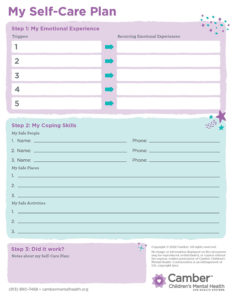What to Expect When a Child Discharges From a Children’s Psychiatric Hospital

When a child is discharged from a children’s psychiatric hospital, they will likely experience a range of emotions and expectations for life after their hospital stay. Choosing to admit a child for inpatient psychiatric care is never easy and it can be an overwhelming decision to make. But it is also a choice that can, and should, be life-changing in improving a child’s emotional and mental health.
After discharge from the hospital, there are important factors to keep in mind as your child re-adjusts to family and community life. The events leading up to a hospital stay and the results of what happens during that stay are not the end of a child’s mental health needs.
The Goal of a Children’s Psychiatric Hospital
The goal of an inpatient hospital stay is to provide immediate stabilization during a crisis and begin the healing process so a child can safely return home to continue therapy and treatment in an outpatient setting. It is not to “cure” an underlying mental health need. The reality is that mental health struggles cannot be “fixed” or eliminated in a few days at a hospital. As with most medical conditions, ongoing care and support are critical for a child’s recovery and longterm success.
For parents and caregivers, there are practical ways to prepare for life after discharge, including:
- Managing medications (if applicable)
- Adjusting routines
- Providing a safe space for your child to feel comfortable
- Scheduling ongoing appointments to continue strengthening your child’s mental health
School professionals and other advocates in the child’s life can support the child by creating moments for meaningful connection. They can ensure the environments around the youth are nurturing and stigma-free. These elements are especially important in the days and weeks immediately following an inpatient stay.
Frequently Asked Questions Answered by Annmarie Arensberg
Annmarie Arensberg, LCSW, LSCSW, is the Vice President of Clinical Advancement at Camber (previously KVC Hospitals), a network of nonprofit psychiatric hospitals and residential treatment centers serving youth ages 6 to 18. Annmarie oversees Camber’s highly skilled admissions and therapy teams as they work to make sure each child has a positive experience and that their treatment and discharge plans are tailored to their specific needs.
LCSW, LSCSW, is the Vice President of Clinical Advancement at Camber (previously KVC Hospitals), a network of nonprofit psychiatric hospitals and residential treatment centers serving youth ages 6 to 18. Annmarie oversees Camber’s highly skilled admissions and therapy teams as they work to make sure each child has a positive experience and that their treatment and discharge plans are tailored to their specific needs.
Below Annmarie answers some of the most common questions parents and caregivers ask when preparing to discharge their child from Camber.
Q: What are the next steps after leaving the hospital?
 Annmarie: Camber’s therapists, case managers, and discharge planners work with the family and community partners to set up aftercare services to ensure continued stability. Every client that discharges from our hospital leaves with appointments set up for medication management (as needed), therapy and any other recommended services. We provide families with information about how to access local crisis services if a mental health emergency occurs again as well as how to contact our Admissions team if the need arises for future hospital stays.
Annmarie: Camber’s therapists, case managers, and discharge planners work with the family and community partners to set up aftercare services to ensure continued stability. Every client that discharges from our hospital leaves with appointments set up for medication management (as needed), therapy and any other recommended services. We provide families with information about how to access local crisis services if a mental health emergency occurs again as well as how to contact our Admissions team if the need arises for future hospital stays.
Each client leaves with an individualized Emotion Regulation Plan that is developed with their Camber therapist. Their Emotion Regulation Plan helps them identify safe people, safe places, and safe activities that can help them if they begin to experience triggers. It also identifies how their caregiver can support them if they feel emotionally or behaviorally dysregulated. Read this blog to learn more about Emotion Regulation Plans and how to help your child make one of their own.
Q: Who will support parents or caregivers before and after discharge?
Annmarie: During the client’s stay with Camber, the main point of contact for parents is the assigned therapist. The therapist provides the family with updates throughout the child’s stay, develops the treatment plan and goals, and works with the family to ensure the client is making progress and can discharge to a lower level of care. The child’s family will also work with other members of our multidisciplinary treatment team. This team includes psychiatrists, nurses, and other direct care staff members. One of our medical professionals will discuss medication management and other treatment needs with the child’s family.
When the child is able to safely discharge to a lower level of care, we encourage families to utilize the outpatient support services we coordinate during the discharge planning process. It is critical that the client attends all aftercare appointments with their outpatient provider in order to maintain stability and continue making progress.
Q: What will the child and their caregiver leave the psychiatric hospital with?
Annmarie: When a client discharges from Camber, they are sent home with:
- Three days’ worth of medication and a prescription for 30 days (if applicable).
- An Emotion Regulation Plan to help identify resources to support the child.
- Follow-up appointments to attend in the community to continue treatment in an outpatient setting.
- Discharge paperwork that goes over medication (when applicable), frequently asked questions, and other resources for caregivers to support the child’s ongoing needs after they leave Camber.
Q: What is “normal” behavior for kids and teens immediately following a psychiatric hospital stay?
Annmarie: Discharging from a children’s psychiatric hospital can be an emotionally difficult experience. A child is leaving a setting in which they may have processed some intense feelings and worked through tough experiences including trauma. It’s normal for clients to be tired and feel nervous, anxious, uncertain or even embarrassed. Parents should talk to their child often after discharge and to do frequent check ins to ensure they are feeling safe and supported. We encourage families to integrate the child back into school soon after discharge and ease the child back into other activities, if necessary, such as seeing friends and family and extracurricular activities.
As Annmarie mentions in our article about what to expect when admitting a child to a psychiatric hospital, the goal is always to get children back home as soon as they are safely able with new skills and a treatment plan to help them achieve ongoing mental wellness.
Transitioning Back to School
After discharging from a children’s psychiatric hospital, the client will need to transition back to home and community life, including school. Depending on the child’s individual mental health needs and experiences, this may introduce new stresses and emotional challenges that should be addressed in order for the child to have a successful re-entry to the school environment. Additionally, discharge treatment recommendations may impact the day-to-day activities that take place before, during or after school hours.
It’s essential that school guidance counselors, the child’s teacher, and other support members understand a child’s unique needs and follow support plans as it pertains to continuing their education. This may include knowing the child’s medication schedule or coordinating the student’s class load in a way that aids continued recovery. School staff, caregivers, and the child’s outpatient provider(s) need to have open lines of communication and frequent check-ins to promote continuous improvement in the child’s wellbeing and success.
Some practical ways guidance counselors can assist in a student’s transition to school include:
- Setting a clear plan for making up class work missed during the hospital stay and any missed class time after discharge.
- Conducting daily check-ins with the student, which is especially important in the days and weeks immediately following an inpatient stay.
- Providing regular, judgment-free communication and updates to parents and other support team members.
- Fostering educational environments that are nurturing to students struggling with mental health challenges.
School guidance counselors, social workers, and other school staff can be a vital part of the recovery effort for a student who has recently had a stay at a children’s psychiatric hospital.
How to Promote Continued Recovery
Patience and communication are key components to a successful discharge and continued mental health wellness. Your child may be struggling with re-entry into daily life, and consistency is important to help them re-establish routines.
Your child might still be struggling with some of the symptoms that led to a hospital stay. It’s important to understand that all is not lost if they seem to regress a little bit. Paying attention to their behaviors and potential triggers is crucial. Reach out to their treatment team if you feel concerned about potential mental health crises re-emerging. But also give them (and yourself) the grace and time needed to re-adjust.
Ask questions and have honest conversations with your child. They may not want to talk about their experiences and that’s okay. Simply telling them you’re happy they’re back home, that their life and mental health wellness are important to you, and offering other affirming comments can be helpful.
When in doubt, reach out to your child’s therapist or other key professional support.







